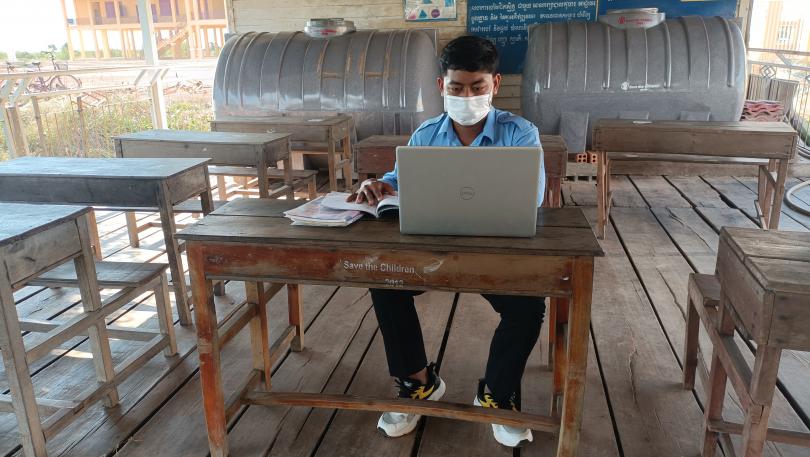A teacher of a former floating school desires to further grow his ICT skills

In the hope that small children in the village can learn and grow up happily, Som Ser, a 27-year-old teacher, is striving to improve himself with teaching methods further and skills related to Information and Communications Technology (ICT) to provide his students with a sufficient and continuous education learning opportunity.
Mr. Ser, whose parents are farmers, passed the entrance exam to become a teacher after graduating high school in 2015. He spent two years studying at Kampong Chhnang Provincial Training Center and was assigned to teach at the Preah Norodom Sihamoni (Ses Slab) floating primary school in 2017.
The school at that time, located in Ses Slab floating village, a site of turmoil in 1979, following the demise of the Khmer Rouge regime, was later becoming a fishing village for many fisher-families.
“I remember the first 5 months, I got boat sickness and vomited a lot. I could not stand still or teach properly because our classroom kept shaking,” he said. “Many times, I wanted to give up teaching there, but I always changed my mind because every time I walked into the classroom, all those small children cheered loudly and laughed happily. I felt so much pity for them.”
In August 2019, the Ses Slab primary school was relocated onto land. It was reconstructed in Chhnuk Trou Commune, Boribo District, in April 2020 with financial support from His Majesty King Norodom Sihamoni. The school name was then changed to Preah Norodom Sihamoni primary and middle school, however most villagers still address its previous name.
The school, where Mr. Ser is permitted to stay in a small room, has 2 buildings of 12 classrooms and currently accommodates 167 students (93 girls) and 7 teachers (3 females).
Like other public and private schools, Mr. Ser said the school was frequently closed in 2021 due to the COVID-19 pandemic and lockdowns. Even though students still could study remotely, online classes were difficult to provide as most students did not have access to electronic devices, and more than half of those teachers could not use technology.
“Most students and parents did not have smartphones. Only 15% to 20% of students in grades 5 and 6 could use their parents’ smartphones to connect to the online classes,” he added. “The internet connection in the area was poor, and we did not even know how to chat or form groups using social media applications such as Telegram, Facebook, Messenger, and Google Meet.”
As a result, Mr. Ser said students’ learning performance was poor, and he couldn't distribute homework sheets to all students because most of his students live in floating houses.
In July 2021, with funding support from Save the Children Korea, Save the Children has worked in collaboration with Provincial and District of Education Youth and Sport to implement the Safe Back to School – Pathways in Educational Equity and Resilience (PEER) project that provided capacity building and training to teachers in organising virtual classes and teaching methods using Information and Communications Technology to produce videos and create online learning groups.
The intervention, Mr. Ser said, has offered him the opportunity to improve his teaching skills further and up to 90% of his students were able to learn remotely, “I can now use all these technology skills and applications to teach and communicate with my students.”

Mr. Soeng Sambona, the school principal, said Mr. Ser is very calm and dynamic in providing students' lectures using ICT skills he learned from the project.
“He has a lot of potentials and is a fast learner. He can use his technology skills to teach better than other teachers,” Mr. Sambona said.
Hai Pisey, a grade 6 student who is also Mr. Ser’s student, said she can now learn from lecture videos created and shared by her teacher in online learning groups.
“I can now talk with my teacher anytime using group chat, and it’s very convenient. My teacher also encourages me and other classmates to continue studying and return to school when it reopens.”




